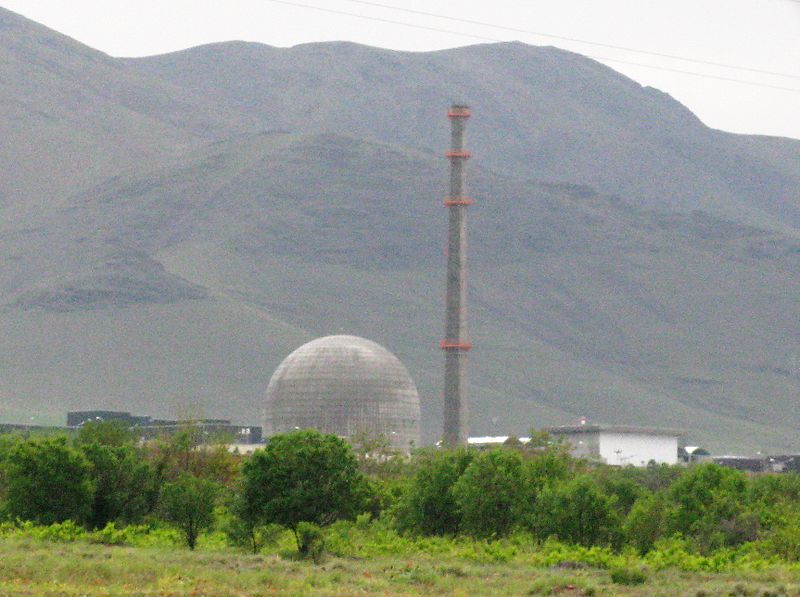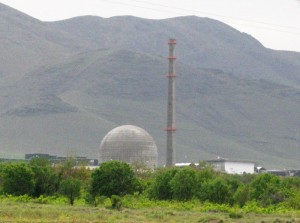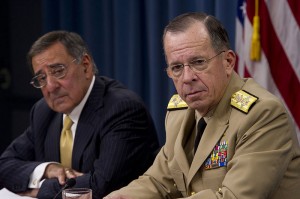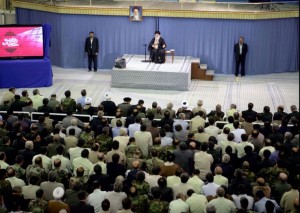
Why Attacking Iran is not the Least Worst Option
Tensions between Iran and the United States have increased dramatically since Iranian Vice-President Mohammad Reza Rahimi declared on December 28th, “If sanctions are adopted against Iranian oil, not a drop of oil will pass through the Strait of Hormuz.” Since then, Iran has become a hot button topic in the press, academia, and on the campaign trail.
 Most of the discussion has been trending towards a harder stance, endorsing either American or Israeli bombing campaigns to destroy Iranian nuclear facilities to prevent Iran from obtaining a nuclear weapon.
Most of the discussion has been trending towards a harder stance, endorsing either American or Israeli bombing campaigns to destroy Iranian nuclear facilities to prevent Iran from obtaining a nuclear weapon.
And this talk, as Brig. Gen. John Adams and Lt. Col. Chris Courtney discussed in their Politico piece, motivates Iran to continue with its hard-line stance. Despite this, many in the foreign policy world are arguing for strikes while overlooking the many negative consequences of such an attack.
First, an attack on Iran would only set back the nuclear program by two or three years. This view has been taken by former Secretary of Defense Gates, current Secretary Panetta, and JCS Chairman Mullen. It is also extremely difficult for the United States to attack Iran’s hardened and underground facilities at Natanz and Qom, the survival of which would allow the Iranians to quickly reconstitute their enrichment program. An American or Israeli attack would drive the program deeper underground and increase its secrecy, reducing intelligence collections capabilities and clouding further NIEs.
 Second, an attack on Iran would increase the power of Iranian government hardliners, unite the population around the government, and convince Iran of the necessity to produce a nuclear weapon to prevent future attacks. After an attack, the government, which has not committed to produce a nuclear weapon, would be virtually forced to produce one in order to deter the United States or Israel from attacking again. Iran’s decision to produce a nuclear weapon would force the United States or Israel to, “mow the grass” and continually bomb Iran.
Second, an attack on Iran would increase the power of Iranian government hardliners, unite the population around the government, and convince Iran of the necessity to produce a nuclear weapon to prevent future attacks. After an attack, the government, which has not committed to produce a nuclear weapon, would be virtually forced to produce one in order to deter the United States or Israel from attacking again. Iran’s decision to produce a nuclear weapon would force the United States or Israel to, “mow the grass” and continually bomb Iran.
Third, Iran would retaliate asymmetrically. JCS Chairman Mullen and former Defense Secretary Gates have both described the consequences of an attack on Iran would be unexpected and most likely bad. Iran’s military disparity with the United States has forced the country to invest heavily in asymmetrical forces centered in the Iranian Revolutionary Guards Corps and their venerable Quds Force.
 The United States experience in Iraq and Afghanistan shows the difficulty of defeating an irregular threat. Iran’s highly trained and well equipped Quds Force wrought havoc on American forces in Iraq, it is not a stretch to imagine a similar but more deadly scenario in Afghanistan.
The United States experience in Iraq and Afghanistan shows the difficulty of defeating an irregular threat. Iran’s highly trained and well equipped Quds Force wrought havoc on American forces in Iraq, it is not a stretch to imagine a similar but more deadly scenario in Afghanistan.
Finally, due to the immediate shock and instability in the region stemming from an attack, the price of oil would soar to record levels. High oil prices would retard U.S. economic growth when the U.S. recovery is just in its infancy and accelerate or worsen IMF’s forecast for a .5% negative growth in the European economy in 2012. This would slow U.S. economic growth and possibly transition the European economy from borderline contraction to recession.
Politics and news aside, when looking at possible attacks on Iran the consequences vastly outweigh the advantages. Attacking Iran is definitely not, to use Matthew Kroening’s words, the least worst option, it is the worst option.






[…] consequences” an Israeli strike could sow. The American Security Project, among others, points out that an attack — which would only amount to a flesh wound — would unite Iranians around […]
[…] consequences’ an Israeli strike could sow. The American Security Project, among others, points out that an attack — which would only amount to a flesh wound — would unite Iranians around […]